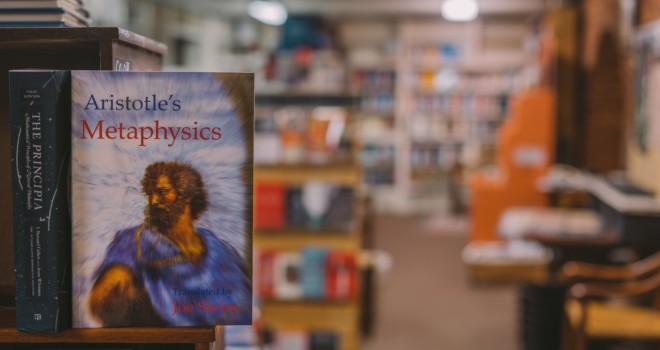Bill Maher, who is not my favorite comedian, has said that philosophy is about as useful as a bidet in a gorilla cage. Well, a bidet may be of no use to a gorilla, but philosophy is certainly of great use to us human beings. As a matter of fact, we could not begin to get dressed in the morning without drawing upon a constellation of philosophical principles. We depend on philosophy far more than we realize. Philosophy, in fact, is so basic that it is usually employed without our noticing its abiding presence. It was not until 1774 that oxygen was discovered. Yet, despite this relatively recent discovery by Joseph Priestly, people had never refrained from breathing in this life-sustaining, though invisible, gas.
Our knowledge of things often comes long after we have derived its benefits. Getting dressed in the morning is an example of this paradoxical phenomenon.
The alarm clock sounds and we rise. We are, after all, bipeds and belong to the biological classification of Homo erectus. We are not dormitive creatures, since that term does not capture our full nature. Sleep is for restoration; it is not our destination. We are rational beings and begin the task of getting dressed utilizing that essential quality by which we are distinguished from brute animals. Thus we begin our day by putting philosophy into practice. We put our socks on before we slip into our shoes. The reverse would be “preposterous”. This word must have been coined by a philosopher since it warns us against the disorder that occurs when we put “before” (pre-) what should be “posterior” (posterius). We must open our mouths before we brush our teeth. You must catch the ball before you tag the runner. Lincoln was a rail splitter before he became president. And so, by avoiding the preposterous, our day begins in an orderly way.
We notice that our socks are not only equal but identical. We might say, “that’s the way it is”. In Spanish, the previous sentence reads: esso si que es, fortuitously sounding out S-O-C-K-S. There is no left or right sock. But our shoes, though equally shoes, are not identical. They are complementary, one belonging to the left foot, the other to its complementary opposite. On reflection, we may also recognize that socks and shoes both belong to the genus of clothing. Hence, we are also logicians. We encounter no difficulty or hesitation in donning our shoes and socks, unmindful of the fact that this simple activity assumes our acceptance of rationality, order, equality, identity, complementarity, and logic. We are all philosophers at the break of day. But during the day we often cannot employ the philosophical values that we affirmed in our mundane task of putting on our socks and shoes.
Saint John XXIII remarked that the sexes are equal in humanity but complementary in mission. The reigning liberal position now is that the sexes are not complementary but only seem so because of cultural conditioning. Yet nature does precede culture, a stubborn fact that seems to be overlooked in the current world. When we become too thoughtful about anything, we often lose sight of what it really is. According to the fable, the millipede is paralyzed when it tries to figure out which of its thousand legs it should move first and in what sequence. Analysis can provoke paralysis. Robert Bork has made the comment that the major obstacles to religious belief in the contemporary world are provided by members of the intellectual class who contend that “science has left atheism as the only respectable intellectual stance.” It might be worth stating that there would be no science if there were no created world. Nor would there be any atheists if there were no God. Creation precedes our understanding of it.
When asked the secret of his success, famed novelist Somerset Maugham once said that it was because each day he did two things he was reluctant to do: “go to bed at night and get up in the morning”. Implicit in his remark is reason’s victory over inertia and an affirmation that one has a better chance of achieving success when he accords priority to reason over self-indulgence. It is also an affirmation that we are rational by nature, a point that has found agreement among the great philosophers of history. Allowing our emotions to displace reason is another example of being “preposterous,” or, to put it into the context of the history of philosophy, it exemplifies “putting Descartes before des-horse”. Descartes’ mistake was putting thinking (“I think therefore I am”) ahead of being (I am first and foremost a human being). And this is why he is dubbed The Father of Modern Confusion. One has to be a human being first before he can engage in thinking.
Etienne Gilson has pointed out that a terrible thing happens when we put man first and God second. The consequence of this preposterous arrangement is that God disappears. Atheism is the inevitable result. God, of course, cannot remain God if He is demoted. In this case, He is lost and his rediscovery becomes exceedingly difficult. Atheism may be grounded more in an exaggerated belief in man than in a denial of God.
In Troilus and Cressida, Shakespeare has Ulysses ask how we can obtain honey when the general is not distinguished from the hive. “The heavens themselves,” Ulysses tells his troops, “the planets and this centre observe degree, priority and place.” Things must “stand in authentic place,” he declares. “Take but degree away, untune that string, and, hark, what discord follows! Each thing meets in mere oppugnancy.” Wise Ulysses understands that on the battlefield, disorder, another name for the preposterous, breeds defeat.
When we slow down the process of such an everyday routine as getting dressed and put our mind to the underlying principles behind what we are doing, we can rediscover the practicality of philosophy. In a sense, philosophy is like oxygen, something that is necessary but unseen. We may begin the day on the right foot, so to speak, and then enter a world where discord reigns. It is a world in which the human unborn are denied their human nature, where money takes precedence over morality, and God is denied His authentic place.
✠
Photo by Tbel Abuseridze on Unsplash












